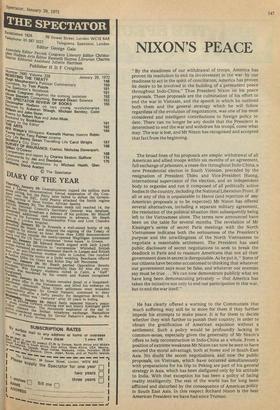NIXON'S PEACE
"By the steadiness of our withdrawal of troops, America has proven its resolution to end its involvement in the war: by our readiness to act in the spirit of conciliation, America has proven its desire to be involved in the building of a permanent peace throughout Indo-China." Thus President Nixon on his peace proposals. These proposals are the culmination of his effort to end the war in Vietnam, and the speech in which he outlined both them and the general strategy which he will follow regardless of the evolution of negotiations, was one of his most considered and intelligent contributions to foreign policy to date. There can no longer be any doubt that the President is determined to end the war and withdraw his troop, come what may. The war is lost, and Mr Nixon has recognised and accepted that fact from the beginning.
The broad lines of his proposals are simple: withdrawal of all American and allied troops within six months of an agreement, full exchange of prisoners, a cease-fire throughout Indo-China, a new Presidential electon in South Vietnam, preceded by the resignation of President Thieu and Vice-President Huong, international supervision of the election, and an independent body to organise and run it composed of all politically active bodies in the country, including the National Liberation Front. If all or any of this is unpalatable to Hanoi (and rejection of any American proposals is to be expected) Mr Nixon has offered several alternatives, including a separate military agreement, the resolution of the political situation then subsequently being left to the Vietnamese alone. The terms now announced have been on the table for several months. The revelation of Mr Kissinger's series of secret Paris meetings with the North Vietnamese indicates both the seriousness of the President's purpose and the unwillingness of the North Vietnamese to negotiate a reasonable settlement. The President has used public disclosure of secret negotiations to seek to break the deadlock in Paris and to reassure Americans that not all their government does in secret is disreputable. As he put it," Some of our citizens have become accustomed to thinking that whatever our government says must be false, and whatever our enemies say must be true ... We can now demonstrate publicly what we have long been demonstrating privately — that America has taken the initiative not only to end our participation in this war, but to end the war itself."
He has clearly offered a warning to the Communists that much suffering may still be in store for them if they further impede his attempts to make peace. It is for them to decide whether they wish further to punish their country, in order to obtain the gratification of American expulsion without a settlement. Such a policy would be profoundly lacking in common-sense, especially given the generosity of Mr Nixon's offers to help reconstruction in Indo-China as a whole. From a position of extreme weakness Mr Nixon can now be seen to have secured the moral advantage, both at home and in South-East Asia. No doubt the secret negotiations, and now the public proposals, on Vietnam, which have occurred simultaneously with preparations for his trip to Peking are part of his general strategy in Asia, which has been disfigured only by his attitude to India. With that exception his has been a policy of facing reality intelligently. The rest of the world has for long been afflicted and disturbed by the consequence of American policy in South East Asia. In this respect Richard Nixon is the best American President we have had since Truman.










































 Previous page
Previous page